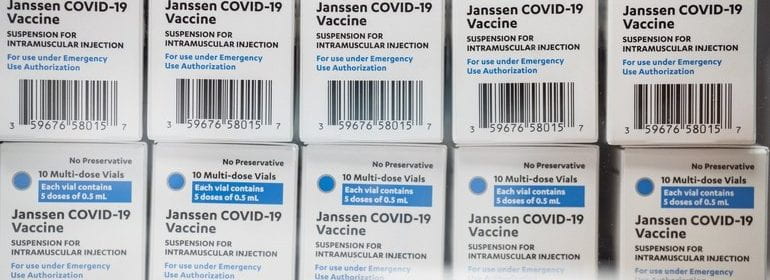Second dose of J&J’s coronavirus vaccine increases protection, company says

A second dose of Johnson and Johnson’s coronavirus vaccine appears to increase protection from moderate to severe COVID-19, the company said Tuesday after months of questions on how well the efficacy of its single-shot regimen would hold up over time.
Summary results from an international Phase 3 trial run by J&J showed an additional shot, given eight weeks after the first, resulted in an estimated 75% protection against moderate to severe COVID-19, compared to placebo. Looking only at study participants in the U.S., J&J reported a higher efficacy estimate of 94%, but that figure was based on far fewer cases than the overall rate.
The efficacy after two doses appears higher than what J&J has reported from a separate late-stage study of the single-shot regimen that was authorized by the Food and Drug Administration in March.
J&J said it would submit detailed data on the efficacy of two doses for publication “in the coming months,” and has already shared results with the FDA.
The efficacy estimates are supported by data, also disclosed by J&J Tuesday, showing that a second dose given two months after the first increased antibody levels “four to six times higher,” according to a company. Furthermore, a booster shot given at six months after the single shot increased antibody levels “nine-fold” one week following and “12-fold” four weeks after.
There are significant limitations to the data released Tuesday, though, not least of which is the relatively short amount of follow-up — 36 days — after the second dose, meaning duration of protection from a booster dose remains uncertain. The company’s efficacy estimates came with a sizable degree of statistical uncertainty and could change over time as more data becomes available.
Also on Tuesday, J&J released updated efficacy estimates from the Phase 3 study of its single-shot regimen, numbers which were lower than what was disclosed at the trial’s primary readout in April. Overall, one dose of the vaccine was 53% effective in protecting against moderate to severe COVID-19 and 75% effective against severe or critical disease, down from the earlier estimates of 66% and 85%, respectively.
The release of this data comes in a week when boosters are top of mind for health officials. Last Friday, an FDA advisory committee voted unanimously in favor of recommending booster doses of Pfizer’s vaccine for adults over 65 or people with a higher risk of severe COVID-19. The FDA has not yet authorized an additional dose in these groups, but is expected to do so in the coming days.
This week is also when the Biden administration had hoped to make boosters widely available to Americans of all ages. But the administration found itself at odds with a decision-making process at the FDA and Centers for Disease Control and Prevention that has moved slower. Two senior FDA leaders, both of whom are unexpectedly departing this fall, also publicly opposed rolling out boosters to the broader public at this time.
To date, about 14.6 million people in the U.S. have been vaccinated with J&J’s vaccine, a number that, while still sizable, is far less than the 99 million people who have received Pfizer’s and the nearly 68 million people given Moderna’s, according to CDC data. Both Moderna’s and Pfizer’s require a two-dose regimen for full vaccination, while J&J’s only requires one as currently authorized.
Like Moderna and Pfizer, J&J has also shared real world evidence supporting its vaccine’s efficacy, disclosing data Tuesday indicating that a single shot was 81% effective at preventing hospitalization in the U.S. Scientists and medical experts have been more cautious about using this type of evidence to inform their decision-making on boosters, though Pfizer did stake a large part of its case for authorization of a third dose on this type of data from Israel.
J&J has not yet formally announced an application to the FDA for approval or authorization of a second dose, although Tuesday’s data could mean a submission is not far off. Moderna has already submitted its application, which the FDA is still reviewing.

